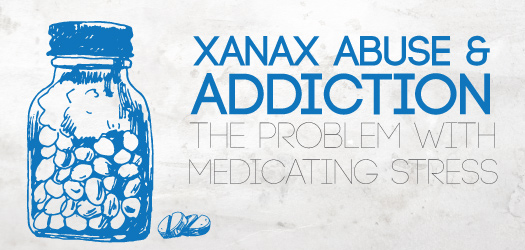Article Contributed by the staff of American Addiction Centers

With the intense demands and high-paced nature of our current society, stressful lifestyles are a hallmark of our nation. Whether a corporate professional, stay at home mom, college student, celebrity, or anything in between, the overwhelming pressure that results from a chaotic and hectic lifestyle can be the cause of much anxiety.
Stressful conditions, coupled with inadequate coping skills, can be the foundation from which anxiety illness develop. According to the National Institutes of Health, a quarter of Americans will have a diagnosed episode of anxiety, including:
- Panic
- Phobias
- Post-traumatic stress disorder
- Generalized anxiety disorder
- Obsessive compulsive disorder
Countless individuals across our nation are facing intense physical and mental consequences from lives that are ridden with anxiety, and sometimes medication is turned to as a “quick-fix” for these issues.
Avoiding the Root of the Problem
While the proven methods of treatment for anxiety focus on dealing with the root issues at the heart of the illness, help is typically sought from medication alone. The National Institute of Mental Health revealed that individuals in treatment for mental health issues spend approximately half of their budgeted money on drugs and less than a third on therapy [2].
Drugs are usually preferred since effects are felt rapidly and with little effort.
Xanax’s Role in American Society
The drug Xanax has quickly become the most popular anti-anxiety medication across our nation. Classified from the family of benzodiazepine drugs, Xanax functions in the body by suppressing the output of neurotransmitters that interpret fear.
Because the symptoms resulting from anxiety can be debilitating, such as the experience of a panic attack or hyperventilation, prescription medications to manage these symptoms are highly desirable. Research from the National Institute on Drug Abuse has estimated that prescriptions for benzodiazepines, such as Xanax, have risen by 17 percent since 2006, making it the most prescribed psycho-pharmaceutical drug [3].
Countless individuals are overwhelmed by the excessive demands of juggling life, including:
- Family
- Work
- Finances
- Health issues
- Relationships
- Other stress factors
It seems that stress is part of daily living for most. Humans have become conditioned to achieve more than what is expected and push beyond limitations. This frame of thinking is the breeding ground for anxiety-ridden disorders.
Xanax Is Highly Addictive
Frequently turning to Xanax for stress and anxiety management can lead to addiction. The chemical structure of Xanax enables it to quickly penetrate the brain, which creates the rapid response to symptoms related to anxiety.
However, while the effects of Xanax have a fast onset, the short half-life of the drug makes for a rapid turnover in the body. Xanax is approved by the Food and Drug Administration (FDA) for the short-term treatment of anxiety disorders, though prolonged use is common and detrimental.
Individuals who begin using Xanax as a means of stress-management may quickly build a physiological and psychological dependence on the drug. They may feel as though they cannot face moments of stress or cope effectively without the medication.
Prolonged use of the drug can also cause adaptive changes in the brain receptors, making the body more tolerant of the drug and less sensitive to its effect.
The Root of the Xanax Issue
Sadly, our culture has influenced the notion that we can “do it all”, but this mentality does not come without a high price. The physical, mental, and emotional demands of keeping up with unrealistic standards can result in frequent experiences of chronic anxiety.
It is important to remember that Xanax is a therapeutic element of a treatment protocol that often involves therapy and counseling. Use of the medication alone will not be effective in resolving any underlying issues that are connected with anxiety, and improper use of the drug can further exasperate the problem.
While Xanax is commonly touted as an effortless cure to pressures that are typically experienced on a day to day basis, abuse of this medication can rapidly snowball into an incapacitating addiction. Treatment programs that specialize in the care of addiction sufferers can be necessary.
Also, learning effective coping mechanisms for handling anxiety and dealing with any root issues are invaluable ways for preparing oneself for stress that can arise at any given time.
References:
- “What is Anxiety Disorder?” National Institutes of Health, http://www.nimh.nih.gov/health/topics/anxiety-disorders/index.shtml
- National Institute of Mental Health, http://www.nimh.nih.gov/index.shtml
- http://www.drugabuse.gov/sites/default/files/rrprescription.pdf
